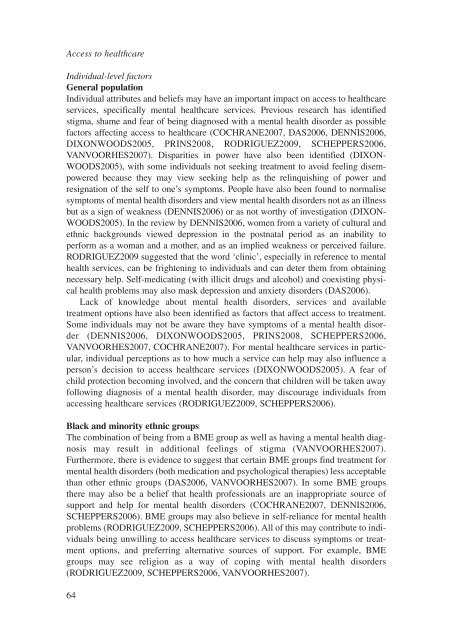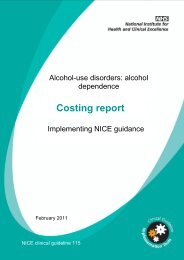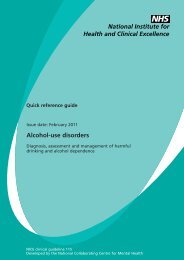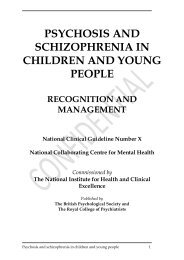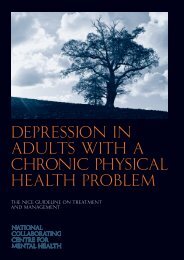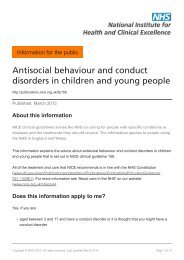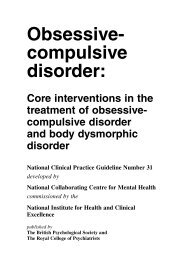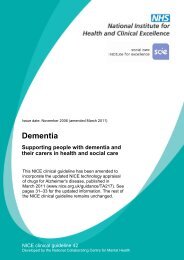CG123 Common mental health disorders - National Institute for ...
CG123 Common mental health disorders - National Institute for ...
CG123 Common mental health disorders - National Institute for ...
You also want an ePaper? Increase the reach of your titles
YUMPU automatically turns print PDFs into web optimized ePapers that Google loves.
Access to <strong>health</strong>careIndividual-level factorsGeneral populationIndividual attributes and beliefs may have an important impact on access to <strong>health</strong>careservices, specifically <strong>mental</strong> <strong>health</strong>care services. Previous research has identifiedstigma, shame and fear of being diagnosed with a <strong>mental</strong> <strong>health</strong> disorder as possiblefactors affecting access to <strong>health</strong>care (COCHRANE2007, DAS2006, DENNIS2006,DIXONWOODS2005, PRINS2008, RODRIGUEZ2009, SCHEPPERS2006,VANVOORHES2007). Disparities in power have also been identified (DIXON-WOODS2005), with some individuals not seeking treatment to avoid feeling disempoweredbecause they may view seeking help as the relinquishing of power andresignation of the self to one’s symptoms. People have also been found to normalisesymptoms of <strong>mental</strong> <strong>health</strong> <strong>disorders</strong> and view <strong>mental</strong> <strong>health</strong> <strong>disorders</strong> not as an illnessbut as a sign of weakness (DENNIS2006) or as not worthy of investigation (DIXON-WOODS2005). In the review by DENNIS2006, women from a variety of cultural andethnic backgrounds viewed depression in the postnatal period as an inability toper<strong>for</strong>m as a woman and a mother, and as an implied weakness or perceived failure.RODRIGUEZ2009 suggested that the word ‘clinic’, especially in reference to <strong>mental</strong><strong>health</strong> services, can be frightening to individuals and can deter them from obtainingnecessary help. Self-medicating (with illicit drugs and alcohol) and coexisting physical<strong>health</strong> problems may also mask depression and anxiety <strong>disorders</strong> (DAS2006).Lack of knowledge about <strong>mental</strong> <strong>health</strong> <strong>disorders</strong>, services and availabletreatment options have also been identified as factors that affect access to treatment.Some individuals may not be aware they have symptoms of a <strong>mental</strong> <strong>health</strong> disorder(DENNIS2006, DIXONWOODS2005, PRINS2008, SCHEPPERS2006,VANVOORHES2007, COCHRANE2007). For <strong>mental</strong> <strong>health</strong>care services in particular,individual perceptions as to how much a service can help may also influence aperson’s decision to access <strong>health</strong>care services (DIXONWOODS2005). A fear ofchild protection becoming involved, and the concern that children will be taken awayfollowing diagnosis of a <strong>mental</strong> <strong>health</strong> disorder, may discourage individuals fromaccessing <strong>health</strong>care services (RODRIGUEZ2009, SCHEPPERS2006).Black and minority ethnic groupsThe combination of being from a BME group as well as having a <strong>mental</strong> <strong>health</strong> diagnosismay result in additional feelings of stigma (VANVOORHES2007).Furthermore, there is evidence to suggest that certain BME groups find treatment <strong>for</strong><strong>mental</strong> <strong>health</strong> <strong>disorders</strong> (both medication and psychological therapies) less acceptablethan other ethnic groups (DAS2006, VANVOORHES2007). In some BME groupsthere may also be a belief that <strong>health</strong> professionals are an inappropriate source ofsupport and help <strong>for</strong> <strong>mental</strong> <strong>health</strong> <strong>disorders</strong> (COCHRANE2007, DENNIS2006,SCHEPPERS2006). BME groups may also believe in self-reliance <strong>for</strong> <strong>mental</strong> <strong>health</strong>problems (RODRIGUEZ2009, SCHEPPERS2006). All of this may contribute to individualsbeing unwilling to access <strong>health</strong>care services to discuss symptoms or treatmentoptions, and preferring alternative sources of support. For example, BMEgroups may see religion as a way of coping with <strong>mental</strong> <strong>health</strong> <strong>disorders</strong>(RODRIGUEZ2009, SCHEPPERS2006, VANVOORHES2007).64


